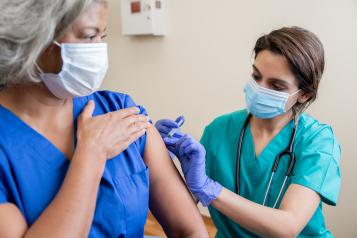Getting to vaccine centres more of a barrier for Black communities

The national roll-out of the vaccine programme has seen over 15 million people receive their first dose in just a matter of months. Whilst this is an incredible achievement, we also know that there is significant variation in uptake within specific communities.
Our recent poll* of almost 2,500 people highlighted that barriers to vaccination go beyond the trust issues already identified, with logistical issues such as the location of vaccine centres and having to use public transport being reported as significant barriers.
Barriers to getting the vaccine
Of those who responded to our survey, 1,791 people said they ‘definitely’ or ‘probably would’ get the vaccine.
However, when we asked them if there was anything that might stop them, logistical issues featured as a key theme.
More than 1 in 5 of respondents (22%) said that the location of where they were asked to get their vaccine could be a barrier to them, with more than 1 in 10 (11%) expressing concern about having to take public transport.
“I can only travel by public transport, so if the site is not accessible by public transport and only for people in cars, then this would be an impediment to travelling there”
When the results are broken down by ethnicity, respondents from Black communities were 50% more likely to see the location of vaccine centres as a barrier and closer to twice as likely to express a nervousness about using public transport.**
With Black and minority ethnic households in the UK over twice as likely to live in poverty, these logistical barriers are unsurprising, with access to private cars or taxis not always an option.
Reasons for vaccine hesitancy
In line with other research, we also found a significant number of respondents who were hesitant about getting the vaccine. In total 359 (15%) people said they would either ‘definitely not’ or were ‘not sure’ about getting the vaccine.
Some of the reasons for this were consistent across ethnic groups such as concerns around vaccine safety and effectiveness, or uncertainty over the ingredients used in it.
However, Black respondents were much more likely to express mistrust about the intentions behind the vaccine programme (47% compared to 28%) and to say they wanted to wait until others had the vaccine before getting it themselves (55% compared to 32%).
This is despite Black respondents perceiving COVID-19 as a more significant threat than White people.
Responding to the findings, Habib Naqvi, Director of the NHS Race and Health Observatory, said:
“Every option to reduce potential barriers faced by black and ethnic minority communities willing to receive a vaccination must be scrutinised and actioned as a priority.
“More needs to be done to mediate and ensure there is an ongoing expansion of vaccination centres across the country which are local, accessible and within easy reach for communities who need the vaccination the most.
“The NHS Race and Health Observatory remains deeply concerned that vaccine uptake for COVID-19 is lower among minority ethnic groups and is urgently exploring practical solutions to help support the NHS and its ongoing response to this challenge.”
What next?
We have shared these findings with the Department of Health and Social Care, NHS England and Public Health England to help them understand and address the barriers that could prevent some people from getting vaccinated.
Over the next few months we will be carrying out further engagement to explore these themes in more detail. In particular, we want to find out what differences exist in attitudes and barriers for different parts of the Black and Asian communities across the country.
We will be using this evidence to help provide assurance that the vaccine is safe and help address specific concerns such as:
- Can it affect my existing medical health condition?
- Are the ingredients harmful?
We will also be calling on partners in Government and the NHS to do more to:
- Promote the different locations where vaccines are available
- Increase the number of vaccine outreach teams
- Ensure vaccination centres are set up in places that are well known and accessible by local communities
- Share honest communications about the effect of having the vaccine and what to expect
Helping people to stay informed
Our efforts to help people get answers to their queries around the vaccination roll-out are supported country-wide by our network of local Healthwatch. They’re also keen to hear your views and experiences of the roll-out. To get in touch with them you can find your nearest Healthwatch by our postcode checker.
If you'd like more information on our findings contact our research team.
* Fieldwork was carried out by Yonder between 22 and 24 January 2021. The survey was conducted online and completed by 2,431 respondents. The sample was disproportionately weighted towards Black, Asian and Minority Ethnic respondents.
** 32% of Black respondents raised concerns about the location of vaccine centres, compared with 21% among White respondents, making Black respondents 52% more likely to have concerns about the location of the vaccine centres. When asked about public transport 19% of Black respondents flagged concerns, compared with 10% for the White respondents, making them 90% more likely to report issues with getting to vaccine centres.


